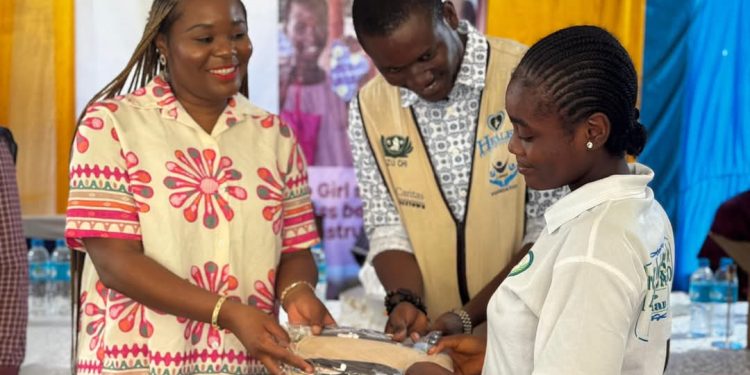By Hassan Osman Kargbo
In a vibrant and impactful observance of World Menstrual Hygiene Day on May 28, the Bo District Office of the Center for Community Impact and Sustainability (CCIS), in collaboration with the Lanyi Foundation and SOS Children’s Village, convened over 140 participants at the SOS Village Compound in Towama, Bo City. The event, themed “Together for a Period-Friendly World,” focused on promoting menstrual health and advancing gender equality.
The gathering brought together a wide range of stakeholders, including pupils, university students, healthcare professionals, educators, civil society leaders, and traditional authorities. Their unified presence highlighted a shared commitment to ending menstrual stigma and advocating for policies that prioritize girls’ health and dignity.
In her special address, Ms. Lyzianah Emakoua, CEO of CCIS, emphasized that menstruation should never be a barrier to education or self-worth. “Every girl deserves the chance to attend school, feel confident, and pursue her dreams—regardless of her menstrual cycle,” she stated. She also encouraged boys and men to become allies by showing support, understanding, and respect toward menstruating peers.
Delivering the keynote address on behalf of the Bo District Council, Deputy Chairperson Madam Alberta Baindu Kowa called for urgent action to dismantle harmful cultural taboos and ensure access to menstrual products. “Menstruation is not a curse—it is a natural and healthy part of girlhood and womanhood,” she asserted. Madam Kowa underscored the need for government-led initiatives to integrate menstrual health into education systems, improve sanitation facilities, and make sanitary products more accessible, especially for girls in rural communities.
Mr. Ishiaka Kargbo, Director of SOS Children’s Village in Bo, added that comprehensive menstrual health education and community sensitization are critical to transforming outdated attitudes. He stressed that ignorance and silence around the topic have marginalized many girls and women, leading to school absenteeism and social isolation.
Health professionals and educators at the event echoed these sentiments, advocating for the integration of menstrual health into school curricula and the regular distribution of sanitary products. They highlighted that supporting adolescent girls with reliable information and hygienic resources is essential to their academic success and psychological well-being.
Practical solutions were also showcased by representatives from SOS Children’s Village and the Lanyi Foundation, including reusable sanitary pad production, mentorship programs, and school-based awareness sessions. As part of the initiative, CCIS—with support from the Lanyi Foundation—distributed over 150 reusable sanitary pad packs, each containing three high-quality pads. These efforts aim to reduce period poverty and foster dignity among menstruating girls.
A particularly moving moment came when a student shared her personal experience of how access to menstrual hygiene resources at her school restored her confidence and allowed her to concentrate better in class. Her story resonated deeply with attendees, serving as a powerful reminder of the real-life impact of menstrual support.
The event concluded with a renewed commitment from CCIS and its partners to continue pushing for menstrual equity across Sierra Leone. Plans are already underway for monthly school-based awareness campaigns, peer educator training, and local pad-making initiatives.
World Menstrual Hygiene Day 2025 in Bo was not only a celebration—it was a declaration. It called on policymakers, community leaders, and families to recognize menstrual health as a human right and a development priority. By fostering inclusive dialogue and sustainable solutions, CCIS and its partners are helping to build a future where no girl is left behind because of her period.
As Sierra Leone aligns with global efforts to strengthen health systems, this year’s observance in Bo has set a strong precedent: when communities unite around dignity and empowerment, lasting progress is possible.













